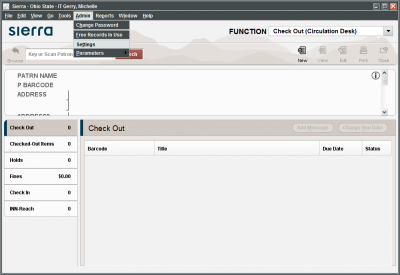Difference between revisions of "Libraries and Ethical Information Technology"
From SI410
| Line 1: | Line 1: | ||
Libraries are concerned with the dispensing and curating of information. Therefore, as Big Data and information shift the landscape of information, their role in information technology shifts as well. <ref>Kim 11</ref> Libraries face challenges through changes from the traditional card catalog system to more technology-driven software (the Integrated Library System, also known as ILS). Additionally, Big Data poses questions for patron privacy and information protection in libraries. Lastly, libraries face ethical implications of the information classification and cataloging processes. | Libraries are concerned with the dispensing and curating of information. Therefore, as Big Data and information shift the landscape of information, their role in information technology shifts as well. <ref>Kim 11</ref> Libraries face challenges through changes from the traditional card catalog system to more technology-driven software (the Integrated Library System, also known as ILS). Additionally, Big Data poses questions for patron privacy and information protection in libraries. Lastly, libraries face ethical implications of the information classification and cataloging processes. | ||
== History == | == History == | ||
| − | Prior to the 1960s, | + | Prior to the 1960s, much of the information handling in libraries was manual. <ref>”Integrated”</ref> However, with the introduction of the Integrated Library System (ILS), questions of information access and patron privacy protection began to surface. <ref>Prindle and Loos 27</ref> While ILSes are an organizational construct, they commonly consist of database storage and other software. <ref>”Integrated”</ref> For example, a program like [https://www.iii.com/products/sierra-ils/ Sierra] that allows library employees to search a patron’s account and view all materials they currently have borrowed is a feature of the ILS. In the past, this would have been recorded on paper and kept in physical files. [[File:Sierra_Checkout.png|400px|thumbnail|right|source: https://library.osu.edu/site/it/customize-your-sierra-display-settings/]] |
| − | + | == Big Data and Patron Privacy == | |
| + | |||
| + | == Ethics of Classification == | ||
== Notes == | == Notes == | ||
| Line 10: | Line 12: | ||
* “Integrated library system.” <i>Wikipedia</i>, Wikimedia Foundation, en.wikipedia.org/wiki/Integrated_library_system. | * “Integrated library system.” <i>Wikipedia</i>, Wikimedia Foundation, en.wikipedia.org/wiki/Integrated_library_system. | ||
* Kim, Bohyun. “Moving Forward with Digital Disruption: What Big Data, IoT, Synthetic Biology, AI, Blockchain, and Platform Businesses Mean to Libraries.” <i>Library Technology Reports</i>, vol. 56, no. 2, 2020, doi:10.5860/ltr.56n2. | * Kim, Bohyun. “Moving Forward with Digital Disruption: What Big Data, IoT, Synthetic Biology, AI, Blockchain, and Platform Businesses Mean to Libraries.” <i>Library Technology Reports</i>, vol. 56, no. 2, 2020, doi:10.5860/ltr.56n2. | ||
| + | * Noble, Safiya Umoja. <i>Algorithms of Oppression</i>. E-book, New York UP, 2018. | ||
| + | * Prindle, Sarah and Amber Loos. “Information Ethics and Academic Libraries: Data Privacy in the Era of Big Data.” <i>Journal of Information Ethics</i>, vol. 26, no. 2, Fall 2017, pp. 22-33. | ||
| + | * “Professional Ethics.” <i>American Library Association</i>, www.ala.org/tools/ethics. | ||
Revision as of 15:30, 12 March 2021
Libraries are concerned with the dispensing and curating of information. Therefore, as Big Data and information shift the landscape of information, their role in information technology shifts as well. [1] Libraries face challenges through changes from the traditional card catalog system to more technology-driven software (the Integrated Library System, also known as ILS). Additionally, Big Data poses questions for patron privacy and information protection in libraries. Lastly, libraries face ethical implications of the information classification and cataloging processes.
History
Prior to the 1960s, much of the information handling in libraries was manual. [2] However, with the introduction of the Integrated Library System (ILS), questions of information access and patron privacy protection began to surface. [3] While ILSes are an organizational construct, they commonly consist of database storage and other software. [4] For example, a program like Sierra that allows library employees to search a patron’s account and view all materials they currently have borrowed is a feature of the ILS. In the past, this would have been recorded on paper and kept in physical files.Big Data and Patron Privacy
Ethics of Classification
Notes
References
- “Integrated library system.” Wikipedia, Wikimedia Foundation, en.wikipedia.org/wiki/Integrated_library_system.
- Kim, Bohyun. “Moving Forward with Digital Disruption: What Big Data, IoT, Synthetic Biology, AI, Blockchain, and Platform Businesses Mean to Libraries.” Library Technology Reports, vol. 56, no. 2, 2020, doi:10.5860/ltr.56n2.
- Noble, Safiya Umoja. Algorithms of Oppression. E-book, New York UP, 2018.
- Prindle, Sarah and Amber Loos. “Information Ethics and Academic Libraries: Data Privacy in the Era of Big Data.” Journal of Information Ethics, vol. 26, no. 2, Fall 2017, pp. 22-33.
- “Professional Ethics.” American Library Association, www.ala.org/tools/ethics.
